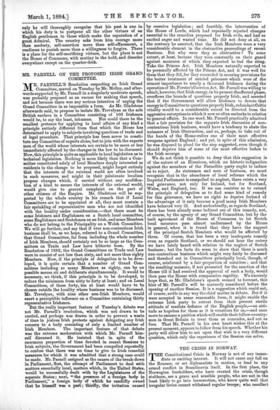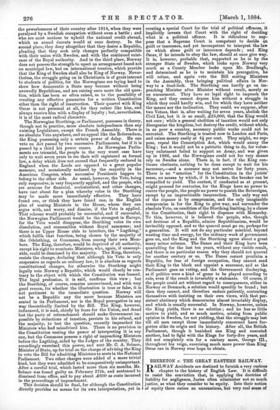THE CRISIS IN NORWAY.
THE Constitutional Crisis in Norway is not of any imme- diate or exciting interest. It will not cause any fall on the Bourses, or set diplomatists in motion, or lead to any armed conflict in Scandinavia itself. In the first place, the Norwegian freeholders, who have created the crisis, though stubborn, are a grave and sensible people, who are not in the least likely to go into insurrection, who know quite well that irregular levies cannot withstand regular troops; who recollect
the powerlessness of their country after 1814, when they were paralysed by a Swedish occupation without even a battle ; and who are most anxious to uphold the national credit abroad, which an armed emeute would at once destroy. In the second place, they deny altogether that they desire a Republic, pleading that they seek only changes perfectly compatible with their union with Sweden, and with the continued exist- ence of the Royal authority. And in the third place, Norway does not possess the strength to upset an arrangement based not on municipal law, but on international treaties, which provide that the King of Sweden shall also be King of Norway. Never- theless, the struggle going on in Christiania is of great interest to students of politics, for the Norwegians are trying hard to show how democratic a State may become without being avowedly Republican, and are raising once more the old ques- tion, which has been so often raised, as to the possibility of creating any effective guarantee for a written Constitution other than the right of insurrection. Their quarrel with King Oscar is not personal at all, for they rather like him, and always receive him with a display of loyalty ; but, nevertheless, it is of the moat radical character.
The Norwegian Storthing, or Parliament, possesses in theory, though not in practice, more absolute independence than any existing Legislature, except the French Assembly. There is no absolute Veto anywhere, and no appeal like the Referendum, the King possessing only a certain power of delay. He can veto an Act passed by two successive Parliaments, but if it is passed by a third his power ceases. As Norwegian Parlia- ments are triennial, the people in the very worst case have only to wait seven years to see their will registered as formal law, a delay which does not exceed that frequently endured in England when the Lords are opposed to a great popular measure, and occasionally endured by the majority in the American Congress, when successive Presidents happen to belong to the other side. As usual, however, the Veto, being only suspensive, is very frequently applied, and the people, who are anxious for financial, ecclesiastical, and other changes, have cast about for a plan whereby votes in the Storthing may be made more immediately effective. They have found one, or think they have found one, in the English plan of seating Ministers in the House, whom they can argue with, and worry, and dismiss, if the Veto is applied. That scheme would probably be successful, and if successful, the Norwegian Parliament would be the strongest in Europe, for the Veto would disappear, the Storthing votes its own dissolution, and reassembles without Royal summons; and there is no Upper House able to interfere, the " Lagthing," which fulfils that function, being chosen by the majority of the Odelsthing, or Commons, from among their own Mem- bers. The King, therefore, would be deprived of all authority, except his right to nominate Ministers, who, again, if unaccept- able, could be dismissed by the majority. The King, therefore, resists the change, declaring that although his Veto is only suspensive as regards an ordinary law, it is absolute as regards constitutional changes, for otherwise the Storthing might legally vote Norway a Republic, which would clearly be con- trary to the object with which the Constitution was framed. The legal profession, it is said, confirms this view ; but the Storthing, of course, remains unconvinced, and with very good reason, for whether the illustration is true or false, it is not pertinent to the immediate question. Norway will not be a Republic any the more because Ministers are seated in its Parliament, nor is the Royal prerogative in any way theoretically limited by the Bill. The King, however, influenced, it is said, chiefly by fears for the Union, and dread lest the party of retrenchment should make Government im- possible by reductions of taxation, persists in his refusal, and the majority, to test the question, recently impeached the Ministers who had misadvised him. There is no provision in the Constitution vesting the power of interpreting it in any one, but the Commons possess a right of impeaching Ministers before the Lagthing, aided by the Judges of the country. They accordingly exercised this power, and sent Mr. C. A. Selmer, Minister of State, up for trial on the charge of advising the King to veto the Bill for admitting Ministers to seats in the National Parliament. Two other charges were added of a more trivial kind, but they were admitted to be comparatively unimportant. After a careful trial, which lasted more than six months, Mr. Selmer was found guilty on February 27th, and sentenced to dismissal from office, and to pay about £600 as costs incurred in the proceedings of impeachment. This decision should be final, for although the Constitution directly provides no means for its own interpretation, yet in
creating a special Court for the trial of political offences, it implicitly invests that Court with the right of deciding what is a political offence. It is ridiculous to sup- pose that a Supreme Court is competent to decide on guilt or innocence, and yet incompetent to interpret the law on which alone guilt or innocence depends ; and King Oscar, if he intends to obey the law, should at once give way. It is, however, probable that, supported as he is by the stronger State of Sweden, which looks upon Norway very much as a County Member looks upon Mr. Bradlaugb, and determined as he is to maintain his prerogative, he will refuse, and again veto the Bill seating Ministers in the Assembly, thus bringing political affairs in Nor- way to a dead-lock. The Storthing can hardly go on im- peaching Minister after Minister without result, merely as an amusement. They have no legal right to impeach the King, and they cannot depose him without a struggle in which they could hardly win, and for which they have neither the means nor the inclination. They could, we suppose, after two Vetoes, that is, after waiting for seven years, abolish the Civil List, but it is so small, £25,000, that the King would not care ; while a general abolition of taxation would not only disorganise the kingdom, but destroy the credit, without which, in so poor a country, necessary public works could not be executed. The Storthing is trusted now in London and Paris, and raises money easily at 4i per cent. They might, we sup- pose, repeal the Conscription Act, which would annoy the King ; but it would not be a patriotic thing to do, for volun- tary enlistment failed to support an Army, and was given up in 1866, and the Norwegians could not for very shame rely on Swedes alone. There is, in fact, if the King con- tinues obstinate, nothing to be done except to wait for his successor,—and a sucessor may not arrive for forty years. There is no " sanction " for the Constitution in the jurists' sense, no means by which, if it is broken, the breaker can be compelled to yield. The contest, if conducted as at present, might proceed for centuries, for the Kings have no power to coerce the people, the people no power to punish the Sovereigns, except by an impracticable insurrection. The only way out of the impasse is by compromise, and the only imaginable compromise is for the King to give way, and surrender the absolute Veto, on condition of the Storthing limiting, by a clause in the Constitution, their right to dispense with Monarchy. To this, however, it is believed the people, who, though not desirous of a Republic, admire Republicanism, would be invincibly opposed, and so the quarrel must go on, perhaps for a generation. It will not do any particular mischief, beyond wasting time and energy, for the ordinary work of government goes on, and the King and the Storthing agree about a great
many minor reforms. The Danes and their King have been quarrelling for the last ten years, without any visible result, and there is no particular reason why they should not quarrel for another century or so. The Danes cannot proclaim a Republic, for fear of foreign occupation, they cannot send their King to the block and appoint a successor, and so the Parliament goes on voting, and the Government disobeying, as if politics were a kind of game to be played according to rule, even if the result is invariably a stalemate. Of course, if the people could act without regard to consequences, either in Norway or Denmark, a solution would speedily be found ; but then they cannot, and therefore endure patiently, contenting themselves with insisting on their own views, with that per- sistent obstinacy which democracies almost invariably display, and which is usually successful. In Norway, however, unless the King yields, there is no solution ; and he has so little motive to yield, and so much motive, arising from public opinion in Sweden, for not yielding, that the struggle may last till all men except those immediately concerned have for- gotten alike its origin and its history. After all, the British Parliament, though it banished one King and executed another, had to fight with the Kings for forty-five years, and did not completely win for a century more, George throughout his reign, exercising much more power than King Oscar can in Norway ever hope to obtain.



































 Previous page
Previous page